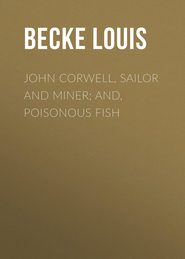По всем вопросам обращайтесь на: info@litportal.ru
(©) 2003-2024.
✖
The Strange Adventure Of James Shervinton
Настройки чтения
Размер шрифта
Высота строк
Поля
As soon as my medicine had cooled a little, I took my first dose. It tasted like Hades boiled down, and made me gasp for breath. Then Niàbon bade me wrap myself up in all the rugs and blankets I could procure, and undergo a good perspiration, assuring me that I should have no more attacks of the dreaded ague after the second dose. Calling one of my native servants, a big hulking native named Tepi, to come and roll me up presently, I first went over to Tematau, and asked him how he was doing, and as I stooped down to examine his head, and see if the dressing was all right, a heavy booted footstep sounded outside, and Krause walked in.
One look at his face showed me that he was labouring with suppressed passion, though trying hard to conceal it.
“Good morning,” I said without advancing to him; “take that chair over there, please. I just want to look at this fellow’s head for a moment.”
He stalked over to the chair I indicated and sat down, and a sudden spasm of rage distorted his face when he saw Niâbon. She was seated at the further end of the room, her chin resting on her hand, and looking at him so steadily and fixedly that he could not but have resented her gaze, even if his mind were undisturbed by passion. Tematau, too, turned his head, and shot his master a glance of such deadly fury that I murmured to him to keep quiet. I rapidly revolved in my mind what course to pursue with our visitor, who, though I could not see his face, was, I felt, watching my every movement.
“That will do,” I said to my patient in the island dialect, which Krause understood and spoke thoroughly; “lie down again. In a few days thou wilt be able to walk.”
“By God, he’s going to walk now,” said Krause, rising suddenly, and speaking in a low, trembling tone. I motioned to him to sit down again. He shook his head and remained standing, his brawny hand grasping the back of the chair to steady himself, for every nerve in his body was quivering with excitement.
“What is the matter, Mr. Krause?” I said coldly, though I was hot enough against him, for he was armed with a brace of navy revolvers, belted around his waist. “Won’t you sit down?”
“No, I won’t sit down,” he answered rudely.
“Very well, then, stand,” I said, seating myself near him.
Then I pointed to the pistols in his belt. “Mr. Krause, before you tell me the business which has brought you here, I should like to know why you enter my house carrying arms? It is a most extraordinary thing that one white man should call on another armed with a brace of pistols, especially when the island is quiet, and white men’s lives are as safe here as they would be in London or Berlin.”
“I brought my pistols with me because I thought I might have trouble with the natives over that fellow there,” he said sullenly, pointing to Tematau.
“Then you might have left them outside; I object most strongly to any one marching into my house in the manner you have done.”
He unbuckled his belt, and with a contemptuous gesture threw the whole lot outside the door.
“Thank you, Mr. Krause,” I said, “I feel more at ease now, so will you kindly tell me the object of your visit?”
“I’ve come to get that swine Tematau. I pay him. He is my man. I shall tolerate no interference. I shall take him back to Taritai” (the name of the village where he lived) “if I have to fight my way out of this village of yours and kill fifty of your niggers.”
“Steady yourself, Mr. Krause, and don’t say ‘your niggers’ so emphatically. In the first place I have but two native servants, not fifty, but either of those two would very much resent your calling him a ‘nigger.’ You know as well as I do that to call a native of this island, or of any other island of the group, a nigger, is so grossly insulting that his knife would be out in an instant.”
“Ah, you and I have different ideas on the subject,” he said sneeringly; “but that does not matter to me at the moment. My paid servant has absconded from my service, and I have come to get him. That is plain enough, isn’t it?”
“Quite. But I am an Englishman, Mr. Krause, and not to be easily bluffed because a man comes stamping into my house with a brace of pistols in his belt.”
“I did not come here to argue. I came here for that nigger—my property.”
“Your property! Is the man a slave? Now, look here, Mr. Krause; you have used the man so brutally that he is unable to stand on his feet. He and the girl–”
“I don’t want the girl, and I daresay you do,” he said, with a sneering laugh that made me long to haul off and hit the fellow between the eyes; “she’s a nuisance, and if I ever again see her prowling about my house and practising her infernal fooleries on my wife, I’ll put a bullet through her. But the man I will have.”
“Stop!” I cried warningly, as he took a step toward the sick man, “stop, before you run yourself into mischief. Listen to me. I have but to raise my hand and call, and you will find yourself trussed up fore and aft to a pole like a pig, and carried back to your village.”
“Out of my way,” he shouted hoarsely, as with blazing eyes he tried to thrust me aside.
“Back, man, back!” I cried. “Are you mad? The natives here will kill you if you attempt to force–”
“And I’ll kill you, you meddlesome English hog,” he said through his set teeth, and, before I could guard, his right hand shot out and grasped me by the throat, and he literally swung me off my feet and dashed me against the centre posts of the house with such violence that I went down in a heap.
When I came to a few minutes afterwards, Tepi was supporting me on his knees, and Niâbon was putting some brandy to my lips. The house was full of natives, who were speaking in suppressed but excited tones. I swallowed the brandy, and then, as Tepi helped me to rise, the natives silently parted to right and left, and I saw something that, half-dazed as I was, filled me with horror.
Krause lay on his back in the centre of the room, his white duck clothes saturated with blood, which was still welling from three or four wounds in his deep, broad chest. I went over to him. He was dead.
“Who hath done this?” I asked.
“I, master,” and Tematau placed an ensanguined hand on mine.
“And I,” said a softer voice, and Niâbon’s eyes met mine calmly. “Tematau and I together each stabbed him twice.”
As soon as I was able to pull myself together, I desired all the natives but three of the head men to leave, and then, after the unfortunate German’s body was covered from view by a large mat, I asked the principal man of the village to tell me what he knew of the tragedy.
“I know nothing,” was his reply. “Niâbon can tell thee.”
Niâbon, in response to my inquiring glance—I was shaking from head to foot as I looked at her, but her calm, quiet eyes as she looked into mine restored my nerve—spoke clearly.
“The German dashed thee against the centre posts of the house, Simi. Then he drew a little pistol from his breast and shot at me, and the bullet struck me on the neck. See,” and she showed us a still bleeding score on the right side of her neck, where a Derringer bullet had cut through the flesh. “And then he sprang at Tematau, but Tematau was on his feet and met him and stabbed him twice; and, as he fell I too stabbed him in the breast.”
“This is an evil day for me,” I said to the three head men, “and I fear it will prove an evil day to the people of this village, for the wife of the man who lies there told me that a ship of war of his country was soon to be here at this island. And how shall we account for his death?”
Niâbon bent forward and spoke—
“Have no fear, Simi. Neither thou, nor Tematau, nor the people of this village, nor I, shall come to any harm from the German fighting-ship. For when it comes thou and I, and Tematau, and Tepi, who know of the blood let out this day upon the floor of thy house, will be far away. And when the captain of the fighting-ship questioneth, and sayeth to the people, ‘Where is my countryman?’ the people will shake their heads and say, ‘We know not. He and his wife, and the Englishman, and Tepi, and Tematau, and the witch woman Niâbon have gone. They have sailed away to beyond the rim of the sea and the sky—we know not whither.”
I listened with all my faculties wide awake, and yet with a strange sense of helplessness overpowering me. Then Niâbon made a swift gesture to the head men. They rose, and lifting the huge body of Krause, carried it away.
She came to me and pressed her hand on my forehead.
“You are tired,” she said in English. “Lie down.”
She took my hand and led me to my couch beside the window and then bent over me.
“Sleep, sleep long. For now the time is near and thou must have strength.”
CHAPTER IV
I slept well on towards four o’clock in the afternoon, and when I awakened I found the house deserted by all but my man Tepi, who was seated cross-legged near me with a cup containing my fever mixture beside him. He held it up to me silently.
Even before I raised myself to drink I felt that I was a stronger man, physically and mentally, than I had been six hours previously, and my veins no longer seemed as if they were filled with liquid fire. I drank the mixture and then looked about me, and saw that every ensanguined trace of the tragedy which had occurred a few hours before had been removed. The coarse and somewhat worn matting which had covered the floor had been taken away and replaced by new squares, and the room presented the usual neat and orderly appearance in which it was always kept by Tepi and my other servant.
“Master,” said Tepi, “art hungry?”
“Aye,” I replied, “I would eat; but first tell me of the dead man. Who hath taken him away?”
The man, instead of answering me in a straightforward manner, bent his head and muttered something I could not hear.
I jumped off my couch and went outside, and the first person I ran against was my cook, an old grizzled fellow of about sixty years of age named Pai. He was carrying a freshly-killed fowl in his hand, looked at me in an unconcerned manner as if nothing had occurred, and asked me would I have it broiled or boiled.
“As you will,” I said impatiently. “Tell me, Pai, whither have they taken the dead white man?”











